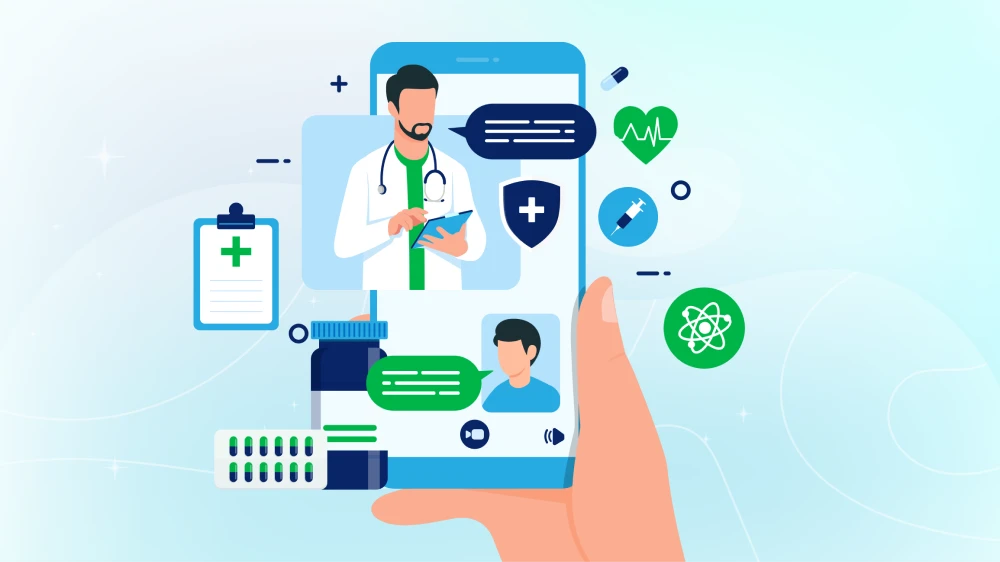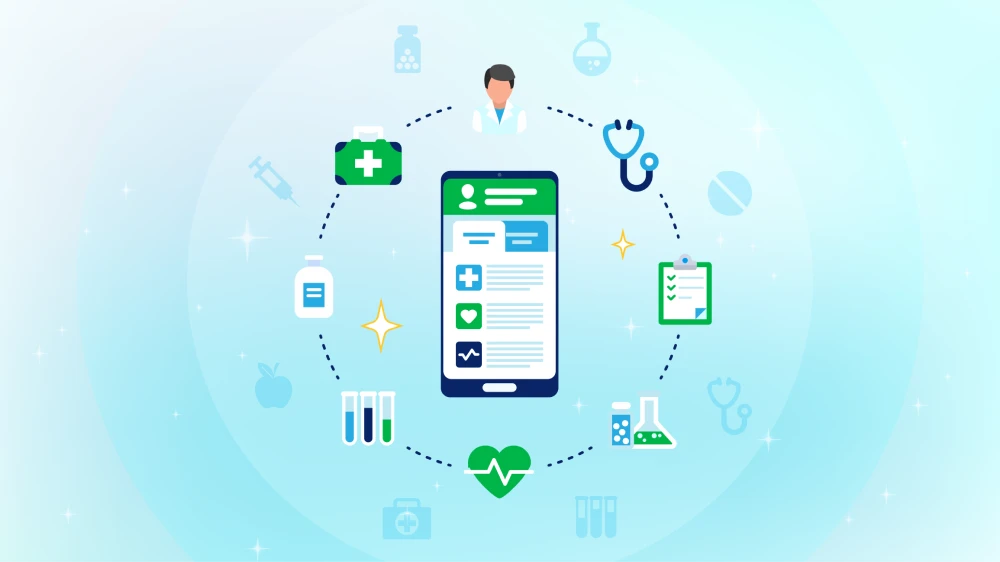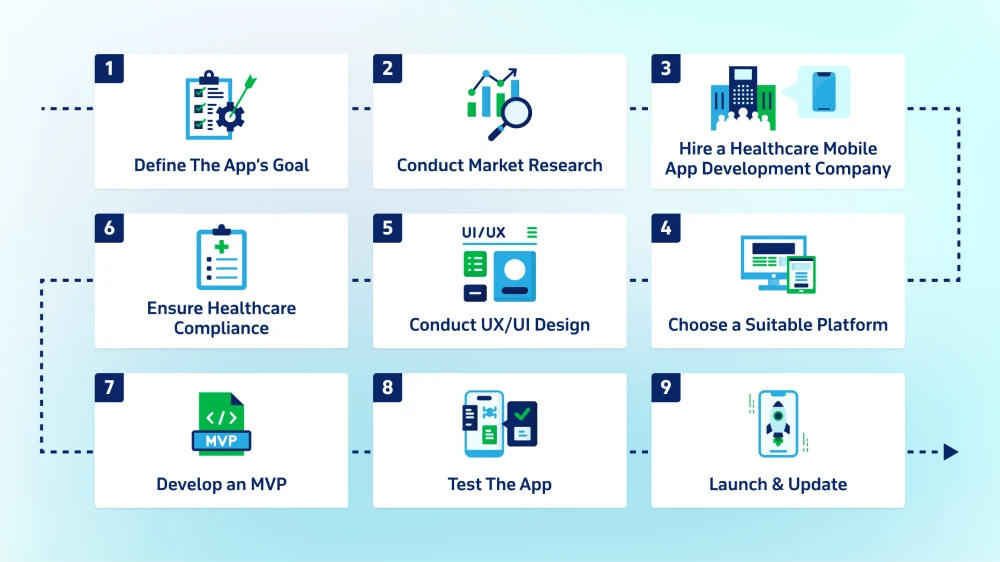The global mobile healthcare applications market is expanding significantly, fueled by a growing demand for accessible and convenient healthcare solutions.
Projections indicate that the market will surpass $300 billion in 2025, underscoring these applications’ vital role in patient care, health monitoring, and wellness management. As technological advancements continue, the need for healthcare mobile apps will increase even further.
This article explores the advantages of healthcare mobile applications and outlines a comprehensive nine-step process for their development.
What is a Healthcare Mobile App?
Health apps are mobile software programs designed to process health-related data for users. They suit anyone looking to maintain, improve, or manage their personal or community health. By providing easy access to medical information, appointment scheduling, and health tracking, these apps empower users to make more informed decisions about their well-being.
Moreover, health mobile apps also boost patient engagement by enabling real-time communication with doctors and personalized patient health monitoring. They pave the way for a stronger bond between patients and providers, leading to more proactive care, better overall health outcomes, and happier workers.
Healthcare Apps for Providers
Several specialized apps are available to support healthcare providers in their daily operations. The apps offer various functionalities, from managing appointments to accessing medical references:
- Doctor Appointment apps
- Electronic media/health records apps
- Medical reference apps
- Healthcare tracking apps
- Networking apps (for doctors)
- Telemedicine apps
Healthcare Apps for Patients
Healthcare apps designed for patients give them more control over their health by providing easy access to medical information, tracking tools, and direct communication with healthcare providers:
- Reminder apps
- Healthy lifestyle apps
- Dieting apps
- Diagnosis apps for preventive purposes
- Fitness apps
Benefits of Healthcare Mobile Apps for Patients and Providers
One key reason for the rising popularity of healthcare mobile app development is its ability to meet the essential needs of both patients and doctors. Below are several notable advantages.

1. Benefits of Healthcare Mobile Apps for Patients
From access and quality to payments and cost, patients care deeply about the following:
- Enhanced access to care:
82% of patients reported delays in accessing medications, according to the 2022 Medication Access Report. Of these, 10% of the delays were caused by communication barriers, which can be resolved by mobile access to patient records, pharmacists, and healthcare providers.
Mobile apps enable real-time communication and seamless access to medical records, helping to eliminate these barriers and improve overall treatment access.
- Reduced treatment cost:
79% of patients encountered unexpectedly higher prices when picking up prescriptions, according to the 2022 Medication Access Report. Healthcare mobile apps enable patients to consult with doctors remotely, reducing the need for in-person visits and the associated costs, such as transportation and time off work.
Additionally, medication non-adherence, which can cost between $5,271 and $52,341 per patient, can be mitigated through healthcare apps that promote adherence, further lowering treatment expenses.
- Receiving higher healthcare quality:
Mobile healthcare apps give healthcare providers a clearer view of patient health, which enables more effective monitoring and early detection of potential issues. Some apps even leverage data analytics and AI to provide personalized health recommendations based on individual health data, helping patients receive care tailored to their needs.
At the same time, pharmacists, with access to treatment information across different healthcare settings, become more engaged in the care team. With insights into real-world drug performance, they can provide more effective treatment for patients.
- Making informed decisions
Healthcare apps give patients easy access to their medical records, simplifying tracking of their health conditions and reviewing treatment options. Patients can make more informed healthcare choices by reviewing clinical records and evaluating treatment options.
These apps encourage patients to actively manage their health to ensure their decisions match personal preferences and needs.
Mobile apps and platforms enable patients to view and pay medical bills online, reducing missed payments and late fees. Payment becomes more flexible with options like credit/debit cards, digital wallets, and even cryptocurrency.
Patients can also use installment plans to spread out the cost of expensive procedures, making healthcare more affordable. Increased transparency helps patients better understand their bills, leading to more informed decisions regarding healthcare spending.
2. Benefits of Healthcare Mobile Apps for Providers
Increase treatment quality, accuracy, and speed with the following:
- Customized patient treatment:
The development of mobile health applications allows healthcare providers to access and analyze each patient’s unique medical history. Providers can create treatment plans based on each patient case, even for large patient volumes. Based on patient records on the app, providers can ensure treatment and care are targeted and personalized, increasing treatment accuracy and improving outcomes.
- Reduced diagnostic errors:
Healthcare mobile applications have innovative diagnosis capabilities that help reduce errors in diagnosis. Doctors can rely on this function to promptly detect errors and make better decisions. Moreover, healthcare mobile applications also provide the ability to predict potential drug interactions and outcomes to ensure patient safety.
- Access to medical reports efficiently:
Mobile health applications also help in storing medical reports and prescriptions securely, allowing for a smooth transition between healthcare providers. Using mobile health applications, patients can share essential information with their doctors, allowing doctors to understand their condition better and make the most informed decisions.
- Remote patient monitoring
Using the healthcare mobile app allows doctors to access the latest data that is constantly updated in real-time, helping to improve the management and monitoring of patient’s conditions. Furthermore, patients can use the healthcare mobile app to report their health status to their doctors instead of making physical appointments, saving time and optimizing resources for patients and healthcare providers.
Must-Have Features in a Healthcare Mobile App Development
Certain key features are essential to ensure that a healthcare mobile app effectively meets the needs of its users and complies with industry standards. Here’s a closer look at the critical features that developers should include:

| Needed Features for Provider App | |
| Doctor’s Profile | Highlight the doctor’s expertise, qualifications, and experience. Include location, contact details, patient reviews, and ratings. Optionally, add a recommendation engine to match doctors based on symptoms. |
| Schedule Management | Allow doctors to manage appointments, view types, and update availability. Include reminders, status updates, and time slot additions. Enable cancellations with reasons, offer ePrescription, and display patient queues for better appointment flow. |
| Patient’s Dashboard | Display personal and clinical details such as diagnosis history, lab results, and medications. For easy analysis, include room assignments, chief complaints, pain levels, and graphical views of medical trends. |
| ePrescription | Enable electronic prescription writing and sending to patients and pharmacies. Access medication history and insurance details for informed decisions. Support prescription creation, ills, and EMR integration to improve accuracy and reduce errors. |
| Clinical Photo Capture | Allow doctors to capture high-quality patient photos with on-screen guides. Ensure consistent sequencing, secure management, and HIPAA compliance, eliminating the need for expensive medical photography equipment |
| Decision Support Systems | Provide tools for evidence-based decision-making, including clinical guidelines and medical calculators. Enable test ordering and result analysis, and integrate a Laboratory Information System for managing test and patient data. |
| Needed Feature for Patient App | |
| Appointment Booking | Register and provide the necessary information to book an appointment. Choose a doctor based on availability and upload health-related documents online before the visit. Integrate with APIs like Calendly for seamless booking. |
| Telemedicine | Answer symptom questions, select a doctor, and schedule e-visits. Receive confirmation for video/voice calls and use photo-based consultations for visual assessments. Utilize WebRTC or Twilio SDK for real-time communication. |
| e-Prescription | Generate and send accurate prescriptions, integrate with pharmacies and health records, and ensure tamper-proofing. Facilitate pharmacy look-ups while complying with HIPAA, HL7, and FDA regulations. |
| Electronic Health Records (EHR) | Access and manage patient records, demographics, and clinical documents in one place. Include remote viewing of medical imaging and manage medication lists, problem lists, and care plans. Capture and present patient-specific instructions and external documents. |
| Pill Reminder | Send push notifications for medication adherence with custom scheduling. Use Firebase or Twilio for notifications and tracking. Display progress on the patient’s dashboard for doctor review. |
| One-Click Ambulance | Request emergency assistance with a single click. Notify trusted contacts and hospitals with precise location details, and find nearby laboratories and pharmacies for support. |
| Hospital Wayfinding Map | Offer indoor maps and turn-by-turn navigation within the hospital. Include parking assistance, save vehicle locations, and use beacons and geofencing for precise positioning and notifications. Help visitors find specific wards or doctors. |
9-Step Guide For Healthcare Mobile App Development
Healthcare mobile app development can be complex and challenging, with regulatory hurdles and user needs. To help you navigate this process, here’s a 9-step guide for a successful launch and ongoing success:

1. Define The App’s Goal
Begin by evaluating the specific problems of users and the requirements to understand their needs. Identify how the application can effectively address these issues and determine its focus, whether managing diabetes, tracking anxiety, or another health concern.
A clear definition of the app’s goal ensures that it meets user needs and achieves its intended purpose.
2. Conduct Market Research
Conduct thorough market research to analyze competitors and identify gaps that your app can fill. Utilize these insights to define distinctive features and functionalities that will make your app stand out.
Research your target audience’s specific needs and behaviors. Talk with patients, doctors, and caregivers to ensure your app meets their expectations. Stay informed about emerging healthcare trends like AI, telemedicine, and wearable technologies to keep your app relevant and innovative in a rapidly evolving market.
3. Hire a Healthcare Mobile App Development Company
When selecting a healthcare mobile app development partner, prioritize teams with a strong product mindset and a focus on lasting solutions. Look for skilled business analysts, UX designers who understand customer needs, and critical thinkers who can plan for scalability and user feedback. A commitment to long-term collaboration and high employee retention ensures consistency and expertise throughout development.
KMS Healthcare is a leading company in providing healthcare software development services tailored to the healthcare industry. With a strong focus on innovation and quality, KMS Healthcare partnered with leading organizations to deliver practical, user-centric applications that enhance patient care and streamline operations.
Also read: Success stories from our clients.
4. Choose a Suitable Platform
Select the appropriate platforms for your app, such as Android, iOS, or web, based on your target audience’s experiences. Consider integrating home assistant devices for voice command accessibility to enhance user experience.
Many elderly patients might favor website access, whereas younger users prefer mobile apps and voice-enabled devices. Tailor your platform choices to align with the needs and preferences of your intended users.
5. Conduct UX/UI Design
UI/UX design plays a critical role in the success of healthcare mobile app development. For older users, prioritize simple navigation and larger fonts to ensure ease of use. In contrast, younger users may prefer vibrant, colorful UIs with advanced functionalities.
Design should consider whether the target audience comprises healthcare professionals or the general public and ensure the app is compatible across various screen sizes for a seamless user experience.
6. Ensure Healthcare Compliance
To protect healthcare data, assign user roles to control access, ensuring only authorized personnel can view it. Employ strong encryption for secure storage and transfer of personal health information while maintaining data redundancy across multiple servers to safeguard against loss.
You can also choose compliance-driven tools that meet healthcare regulations and customize them to your app’s specific needs to uphold all legal and security standards.
7. Develop an MVP
Create a Minimum Viable Product (MVP) to test and validate your app’s core features before full-scale development. MVP is the minimum viable version with only core features of your mobile apps, allowing you to demonstrate the app’s demand and potential to investors while showcasing plans.
Ensure thorough testing of the MVP to gather valuable feedback and make necessary improvements, setting the stage for a successful market launch.
8. Test The App
Conduct comprehensive user experience, interface, and content testing to ensure quality and efficiency. Prioritize security, protecting Protected Health Information (PHI) and Personally Identifiable Information (PII), and ensure adherence to relevant regulations. Verify the functionality of healthcare workflows and the safety of APIs, especially those used for geolocation.
Test data interpretation from various inputs and networks and evaluate performance under poor connectivity conditions. Perform in-depth usability testing to identify areas for improvement and enhance the app’s overall reputation.
9. Launch and Update
After final testing and iteration, launch the app for end users and continuously monitor its performance. While the initial development is a one-time process, ongoing upgrades and maintenance are essential for long-term success.
Regularly track app performance to ensure timely updates and maintain competitiveness in the healthcare industry. Be aware that ongoing maintenance contributes to the overall healthcare mobile app development costs.
How to Choose The Right Healthcare Mobile App Development Partner
When selecting an outsourcing partner for mobile healthcare software development services, they must recognize the differences between enterprise and product software needs. Here are six key traits to seek in a successful partner.

- Product Mindset Excellence
Differentiate yourself in the healthcare market. A successful healthcare mobile app development project relies on a team that creates lasting solutions rather than just custom offerings.
Effective product teams understand the importance of disciplined releases, selecting appropriate tools and technologies, automation, and continuous optimization.
- Roles Focused on Products
Business analysts and user experience designers are crucial in developing the app’s prototype, framework, and design. They must possess keen insights and creativity to understand customer needs and address their challenges effectively. - Emphasis on Designers over Coders
Software engineers should adopt a thoughtful approach to app creation rather than merely coding to specifications. An outsourcing partner with this capability can provide a competitive edge by anticipating future challenges, such as scalability, updating modern interfaces, or adding features based on user feedback.
- Testers Familiar with User Needs
Exceptional testers go beyond standard testing protocols by immersing themselves in the user experience. They offer valuable suggestions for enhancements that align with user needs, ensuring that users get the most from the app. - Dedication to Long-Term Success
Look for a healthcare mobile app development partner with a proven history of long-term commitment. The same team responsible for developing the app should stay involved throughout multi-year development cycles, ensuring ongoing maintenance and updates. - High Employee Retention
Imagine having the same engineers and managers working on your app from start to finish. Experienced team members deliver better results, and high retention rates indicate a happy, productive workforce.
For more in-depth insights on choosing the right healthcare mobile app development partner, including detailed strategies and best practices, download our eBook today!
Develop Your Healthcare Mobile App with KMS Healthcare
The healthcare industry is evolving rapidly, and your app needs to stand out with advanced features and seamless user experiences. KMS Healthcare excels in developing innovative and user-friendly healthcare apps that enhance patient care and streamline workflows for medical professionals.
- Custom Digital Solutions: Develop tailored mobile apps for all healthcare needs, including provider management, care delivery, data analytics, and patient experience.
- Speed-up-time to market: KMS Healthcare ensures faster healthcare mobile app delivery through optimized workflows and continuous testing, swiftly getting your app into users’ hands.
- Expert Development Team: Leverage KMS Healthcare’s mobile healthcare app development expertise to bring your vision to life with user-centric designs and advanced technologies like AI & ML.
Looking for a healthcare mobile app development company that’s platform-certified? Contact KMS Healthcare today and discover how we help deliver exceptional healthcare apps to the market.
